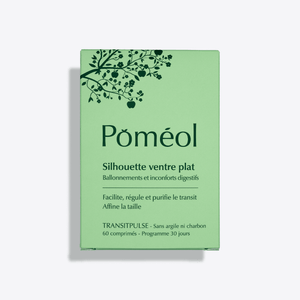Constipation results in a slowdown in intestinal transit that can cause discomfort, discomfort or bloating and thus disrupt the daily life of a large number of us. It is characterized by stools that are too hard, difficult to pass and infrequent. It is therefore essential to understand its mechanism And to identify the solutions that exist For regulate its transit And increase intestinal comfort.
To better understand this digestive disorder, zoom in on the intestinal microbiota : a microbial community living in the digestive tract; essential for digestion , nutrient absorption and regulation of the immune system!
As you can guess, in this article we will discuss the microbiota and its role in slowing down transit to arrive at the following conclusion: probiotics can help effectively relieve intestinal discomfort and fight against slowed transit!

What is the intestinal microbiota?
At birth, our sterile digestive tract is quickly colonized by microorganisms, thus forming our microbiota. Also called intestinal flora , this microbiota stabilizes around the age of 2, counting more than 100,000 billion microorganisms in constant evolution and becomes more and more complex with age.
Among the microorganisms that make up the microbiota, we mainly find bacteria (there are more than 500 species in the intestinal microbiota of adult humans).
The role of probiotics on our intestinal microbiota
Probiotics are live microorganisms which, when administered in sufficient quantities, exert beneficial effects on health . These microorganisms are carefully selected to help the microbiota stay balanced .
Probiotics are found in fermented foods, dietary supplements and functional foods, also called nutraceuticals. When they reach the intestine, they associate with the already existing microbiota, influencing its composition and balance. Probiotics have varied roles, some of which are beneficial for digestion, immunity and bowel regularity.
Probiotics: Yes, but not just any way!
To regulate the use of probiotics in health products, the competent authorities have established criteria for use. These include safety, the identity of the strain, clinical trials and the dose used with the ultimate aim of avoiding deviations, preserving health and promoting effectiveness.
During ingestion, few microorganisms resist the hostile environment of the stomach before reaching the intestine. They must therefore be ingested regularly and in sufficient quantity to see positive effects appear. In addition to their resistance, the strains must also be able to compete with the already established microbiota in order not to perish.
Among probiotics, we most often find bacteria of the genus Lactobacillus, Bifidobacterium and certain Bacillus. Often from the lactic acid bacteria family, these bacteria are harmless to health.
Probiotics in the management of slow transit
Just like the beneficial bacteria of the microbiota, probiotics have the power to ferment certain fibers and proteins into smaller substances which will then be absorbed by the body.
They are also beneficial for health because they strengthen the immune system . They can help prevent intestinal infections and certain chronic digestive pathologies. They can also have a positive effect on cardiovascular risk factors (e.g. hypercholesterolemia, hypertension, obesity).
Probiotics play a beneficial role in the management of slow transit by acting on several key mechanisms of the digestive system. Here's how they can help alleviate this problem:
- Probiotics play a key role in promote the growth of beneficial bacteria and prevent the growth of harmful bacteria.
- Probiotics have the ability to increase the frequency and regularity of contractions in the muscles and intestinal mucous membranes. This helps activate the movement of the stools through the colon.
- Finally, probiotics can improve the consistency and volume of stools . They increase the water and fiber content in feces. The stools then become less hard and easier to pass, thus reducing the feeling of constipation and pain.

Probiotic food supplements to combat slowing transit
The effects of probiotics on slowing transit vary from one person to another. The effectiveness of the food supplement depends on the species, dose, duration and lifestyle of each person. But what is certain is that food supplements containing probiotic strains constitute a natural response in the management of slowed transit. Available in different dosage forms (e.g. capsules, tablets and powders), they contain different species and concentrations of probiotics, hence the importance of choosing the most effective of them!
To help you choose a probiotic food supplement , here are some elements to take into account:
- Be demanding! Look for strains like Bifidobacterium lactis, Lactobacillus sporogenes, also called Bacillus coagulans, which have demonstrated real effects on transit. The Poméol transit food supplement is a multi-action food supplement which aims to reduce bloating, promote detoxification and elimination, regain comfortable digestion and restore the regularity of transit, in particular thanks to the presence of Bacillus coagulans at the heart of the formula. .
- Show rigor! To feel the effects of a treatment, regularity is essential! Be sure to follow the manufacturer's instructions regarding dosage and frequency.
- Take precautions! In the event of digestive problems, do not hesitate to seek advice from a health professional before taking a food supplement containing probiotics.
What you must remember
Understanding the intestinal microbiota has highlighted the usefulness of probiotics in managing slowed transit. They can help restore the balance of the microbiota by improving the consistency and frequency of stools and thus promote comfort.
By acting on various mechanisms of the digestive system, probiotics offer a natural solution to alleviate digestive discomfort. Food supplements containing them are then a promising option for managing slowed transit, when they are chosen wisely!
To improve your digestion with food supplements, take a holistic approach: eat balanced , drink enough of water, practice regular physical activity and show rigor!
For the rest, probiotics take care of it.


